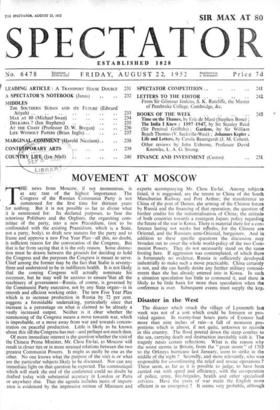LIBRAS.
MOVEMENT AT MOSCOW
THE news from Moscow, if not momentous, is at any rate of the highest importance. The Congress of the Russian Communist Party is not summoned for the first time for thirteen years for nothing. But it is not possible so far to divine what it is summoned for. Its declared purposes, to fuse the nOtorious Politburo and the Orgburo, the organiSing com- mittee of the party, into a new Praesidium, (not to be confounded with the existing Praesidium, which is a State, not a party, body), to draft new statutes for the party and to frame and approve a new Five Year Plan—all this, no doubt, is sufficient reason for the convocation of the Congress. But that is far from saying that it is the only reason. Some distinc- tion must be drawn between the grounds for deciding to hold the Congress and the purposes the Congress is meant to serve. Chief among the former may be the fact that Stalin is seventy- three and understood to be in indifferent health. It is not likely that the coming Congress will actually nominate his successor, but he may well be anxious to ensure that all the machinery of government—Russia, of course, is governed by the Communist Party executive, not by any State organ—is in smooth and efficient working order. The new Five Year Plan which is to increase production in Russia by 72 per cent. suggests a formidable undertaking, particularly since that increase is a percentage on what is claimed to be already a vastly increased output. Neither is it clear whether the summoning of the Congress means a move towards war, which is improbable, or a move away from war and towards concen- tration on peaceful production. Little is likely to be known about this till the Congress has met—and perhaps not much then.
Of more immediate interest is the question whether the visit of the Chinese Prime Minister, Mr. Chou En-lai, to Moscomi will result in closer ties or in more strained relations between the two greatest Communist Powers. It might as easily be one as the other. No one knows what the purpose of the visit is or what are the particular subjects likely to be discussed. Nor can any immediate light on that question be expected. The communiqué which will mark the end of the conference could no doubt be drafted today with substantial accuracy in London or Paris or anywhere else. That the agenda includes items of import- ance is evidenced by the impressive retinue of Ministers and experts: accompanying Mr. Chou En-lai. Among subjects, listed, it is suggested, are the return to China of the South. Manchurian Railway and Port Arthur; the transference to China of the port of Dairen; the arming of the Chinese forces by Russia" and the financing of that operation; the question of further credits for the industrialisation of China; the attitude of both countries towards a resurgent Japan; policy regarding the future of the war in Korea. There is material there for a con- ference lasting not weeks but nit•nths, for the Chinese are Oriental, and the Russians semi-Oriental, bargainers. And in: addition to these specific questions the discussion may broaden out to cover the whole world-policy of the two Com- munist Powers. They do not necessarily stand on the same footing here. If aggression was contemplated, of which there is fortunately no evidence, Russia is sufficiently developed industrially to make such a move practicable. China certainly is not, and she can hardly desire any further military commit, ments than she has already entered into in Korea. In such a situation speculation has little to commend it, and there is likely to be little basis for more than speculation when thet conference is over. Subsequent events must supply the_ key:,


























